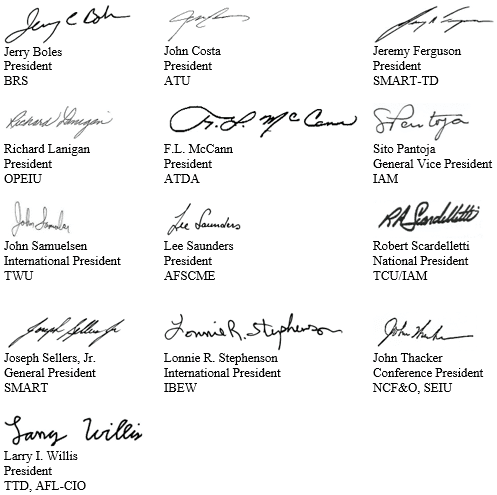
April 8, 2020
The Honorable K. Jane Williams
Acting Administrator
Federal Transit Administration
U.S. Department of Transportation
1200 New Jersey Ave, SE
Washington, DC 20590
Dear Acting Administrator Williams:
First, we want to thank you and your staff for your hard work ensuring that funding provided through the Coronavirus Aid, Relief, and Economic Security (CARES) Act was apportioned to transit agencies in such an expeditious manner. The $25 billion in emergency funding provided by the CARES Act comes at a critical time for public transportation, the frontline workforce who operate and maintain it, and the millions of Americans—including health care workers, law enforcement, first responders, and other safety personnel—who still rely on it every day during this crisis.
As you know, these funds are provided for capital and operating expenses related to the coronavirus health emergency, including the purchase of personal protective equipment (PPE) and paying the administrative leave of operations personnel due to reductions in service. While PPE and cleaning supplies are eligible for 100 percent federal reimbursement, we understand that there are significant challenges—largely related to demand and global supply chain disruptions—in securing adequate safety equipment for public transportation personnel.
While we stand by the critical importance of the work our members are providing during this crisis, we must also consider their health and the health of those around them. Stories of frontline public transportation workers contracting COVID-19 and tragically dying from the virus are already emerging around the country, and it will only get worse in the coming weeks and months. To ensure the best use of the emergency funding provided by the CARES Act and to protect the health and safety of the frontline workforce and traveling public, we request the following:
First, the Federal Transit Administration should issue immediate and specific interim guidance to public transportation agencies and local governments on the minimum level of PPE for essential frontline employees and cleaning procedures for public transportation services and facilities. At a minimum, this should include masks, gloves, and cleaning supplies for transit workers; and mandatory cleaning standards for trains, buses, subway cars, and public transit stations that are consistent with existing guidelines from the Centers for Disease Control and Prevention and the National Institute for Occupational Safety and Health.
Second, if a public transportation agency or local government is not able to meet these guidelines and is therefore not able to provide service, and in keeping with the intent of the CARES Act, the FTA must ensure that transit agencies provide continuity of pay to employees until such a time that the established requirements can be met.
Finally, the FTA should urge transit agencies to follow back-door loading policies on all buses, when possible, for all non-ADA passengers to minimize exposure to bus operators, and to set temporary maximum passenger loads that allow for social distancing of passengers.
Taking these steps now will ensure not only the health and safety of America’s frontline public transportation workforce, but also that this critical transportation service continues to operate regularly when we emerge from this crisis.
We thank you for your consideration and would be happy to have further discussion with you or your staff about proactive steps we can take to reduce harm and loss of life during this crisis.
Sincerely,
Related News
- Senate Passes Tax Bill Without Including Railroaders
- Canada Day 2025: General President Coleman’s message to members
- SMART-TD Honors the Retirement of Brother Greg Hynes: A Visionary, a Fighter, and a Legend
- SMART-TD Calls on U.S. Senate to Support the Cantwell Amendment and Protect Rail Workers
- Yardmaster Protection Act Introduced
- PHOTO GALLERY: 2025 Denver Regional Training Seminar
- Fighting for Stronger Heat Protections for Rail Workers
- Regional Training Seminar Sets (Mile-High) Record in Denver
- Registration Open for Anaheim Regional Training Seminar
- Local 9 wins work-creating law for members in Colorado
